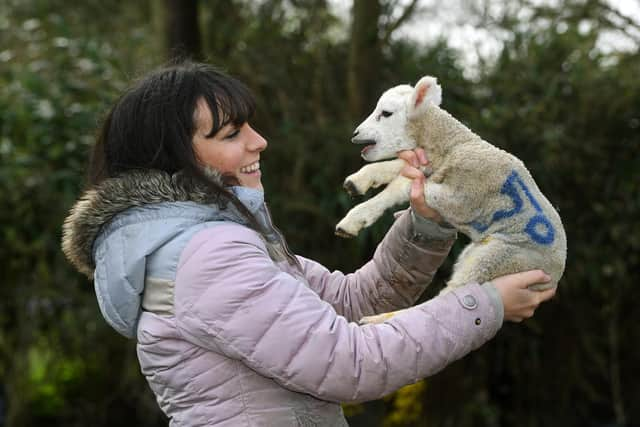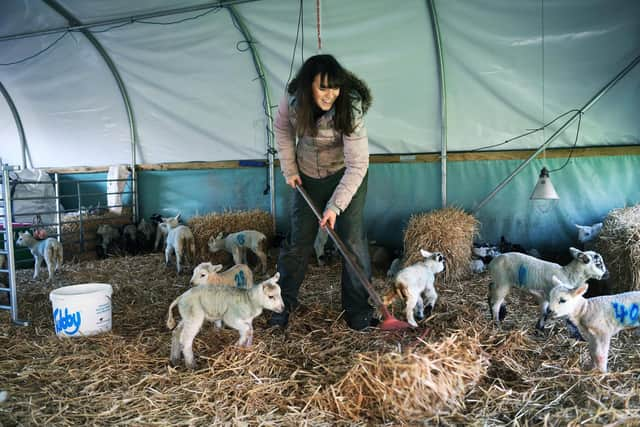Yorkshire Lamb Orphanage: Meet the young woman whose passion for night lambing helped her start her own flock
Molly Cavell of South Duffield now combines night-time lambing with raising orphan lambs and over the past two years has created the Yorkshire Lamb Orphanage from which she has retailed her lamb, has started her own flock and is about to educate young children about farming and food.
Not bad at all from a young lady who doesn’t come from a farming background.
Advertisement
Hide AdAdvertisement
Hide AdMolly said when she started her agricultural course at Bishop Burton College her opening words were a little at odds with her fellow students.


“The tutor was asking what animals people had and I was the only one not from farming. I said I had a tortoise and a cat.
“After I left college I got my first block of sheep, ten stores from Otley livestock market that I bought at 30 kilos and I took through to 50 kilos and sold as half lamb fresh meat boxes, using local processors Mounfields in Bubwith.
“I got 22 the next year and started supplying Parkin’s butchers in Howden.”
Advertisement
Hide AdAdvertisement
Hide AdIt was while she night lambed that Molly had the seeds of an idea that developed into the Yorkshire Lamb Orphanage, now in its third season.


“Nobody wants to do lambing at night, but I love night lambing and after I’d started doing it for somebody else I contacted Bishop Burton College about their night lambing and did it for three years.
“At the first farm I’d night lambed I’d seen that orphan lambs were a problem for farmers who have so many ewes lambing at once that they physically don’t have the time to give to those lambs that cannot suck straight away to their mothers.
“My first thought was ‘can’t I have them?’ Farmers in those positions don’t have time to fill up a milk feeder using milk powder and water; or get them used to a feeder; but I do.”
Advertisement
Hide AdAdvertisement
Hide AdMolly said that she saw a way whereby she could rear the orphan lambs so that they became as useful as the lambs the ewes had already sucking into their teats.
“These orphan lambs were often not getting reared, but I knew I could rear them.
“The milk powder costs money, as do any inoculations and vet visits but I am still making a business out of it.
“It’s still about rearing for meat at the end of the day, but it has also helped me start my own flock and I’m keeping the best of the ewe lambs each year to gradually build it up. I’ve twelve breeding ewes at present.
Advertisement
Hide AdAdvertisement
Hide Ad“In the first year of Yorkshire Lamb Orphanage nobody knew me, so I didn’t get many phone calls apart from a friend or two saying they had maybe a couple. I had 35 orphan lambs that year.
“Last year I bought a polytunnel where I look after them and train them to the feeder. I had 160. This year it’s already looking like being 250. I’m picking up 90 next week.”
Molly said the orphan lambs come from as far as Settle, Skipton, Sheffield, Thirsk and Beverley.
“I collect them. They are often day or two-day old lambs, perhaps up to three or four days old if the farmer has saved them up until they have a significant number.
Advertisement
Hide AdAdvertisement
Hide Ad“It’s mostly the main breeds and crossbreeds of commercial sheep farmers that I get, which are Mules and Texels.”
Molly also has her commercial reality head firmly fixed to her shoulders and said she doesn’t suffer fools gladly.
“I have several farmers that just ring me and say they have some ready and that I can just take them away, then there are some who want to charge me silly money for their two-day old lamb they don’t want to look after.
“Milk powder isn’t cheap, jabs aren’t cheap and fuel is as we all know going up and up.
Advertisement
Hide AdAdvertisement
Hide Ad“The orphan lambs haven’t had their mum’s milk and that generally means they all grow differently. I have a garage full of milk powder and give them milk until 35 days and then they go outside.
“All mine go on cold milk as that stops bloating and saves on heating the milk.
“If it gets to the stage where I have too many on at once I will send some to market as stores at 30 kilos.”
Molly’s polytunnel is currently based on her parents’ land that is part of their house, but she said she has a field that she has bought and has plans to move everything to it in the near future, as well as starting her next idea.
Advertisement
Hide AdAdvertisement
Hide Ad“I’ve just taken on my insurance to have school and nursery visits to include feeding the lambs and educate young children on where their food comes from.
“When it is my own lambing time I would then be able to run my own lambing days.
“I see my field eventually being all set up as a petting farm with ewes, lambs, chicken and goats. I also see myself going into schools with them plus taking an incubator to show eggs hatching.”
Molly isn’t getting ahead of herself and said that she currently has her year well mapped out.
Advertisement
Hide AdAdvertisement
Hide Ad“It is night lambing and rearing orphans now, taking them through to finishing.
“I have day-old turkeys arriving in June that will be reared for Christmas; a grain sampling job in September; and then my own flock to lamb in December/January before starting all over again.
“I still love my night lambing. I’ve just got back from Warwickshire, I also lamb in Dorchester and at the same time as I’m looking after my orphan lambs I’ve also just been asked to night lamb for a local farmer.”
